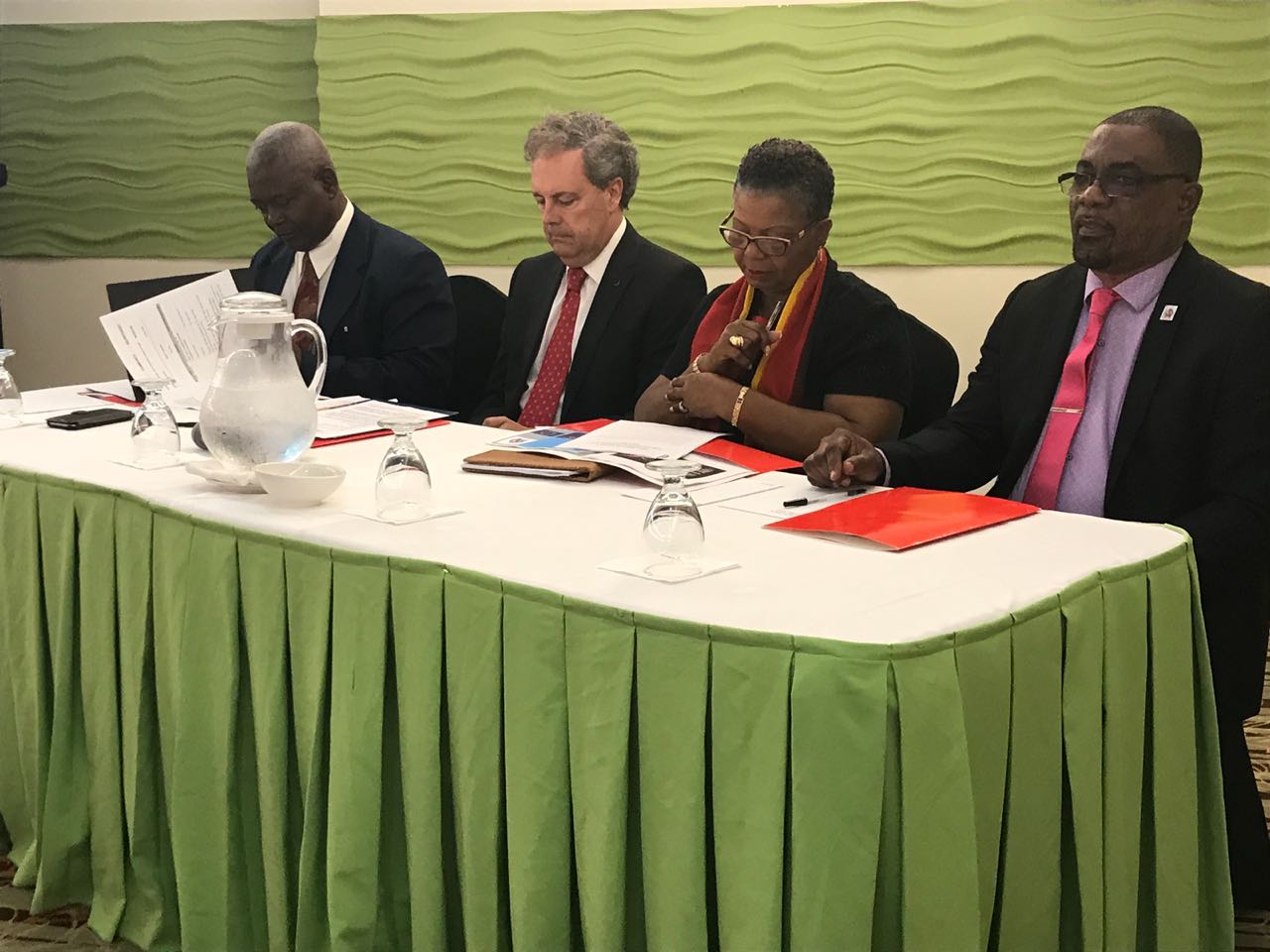
Good Response to Faith Leaders Consultation"Faith-based organisations have a pivotal role to play" says Hon. Cynthia Forde, Minister of People Empowerment and Elder Affairs, Barbados,
The Pan-Caribbean Partnership against HIV and AIDS (PANCAP), with funding from the CARIFORUM 10th European Development Fund (EDF) Programme of Support for Wider Caribbean Co-operation, recently hosted the Barbados National Faith Leaders Consultation at the Radisson Aquatica Resort in Barbados.
According to the PANCAP Co-ordinating Unit, the Consultation formed part of a series of engagements with faith leaders in Barbados, under the PANCAP Justice for All programme. As such, participants included numerous faith leaders, representing national faith leaders’ networks from across Barbados.
“The action plan (included, but was not) limited to the establishment of the main goals for an inter-religious faith leaders network in Barbados with emphasis on contributing toward the end of AIDS; identification of the lessons learned for ending AIDS from faith leaders’ engagements with People Living with HIV and with other groups such as parliamentarians, youth leaders, civil society and members of church communities; challenges for developing a viable Faith Leaders Network and proposals for overcoming them; specific recommendations to achieve the goals of the inter-religious/faith leaders network and priorities and timelines for achieving the goals of the Network.”
Now it was during this Faith Leaders Consultation, that the point was made that when it comes to tackling HIV and AIDS, faith-based organisations have a pivotal role to play. Such was the suggestion made by Minister of People Empowerment and Elder Affairs, Cynthia Forde, who delivered the feature address. She was at the time speaking as the Minister responsible for People Empowerment, the co-ordination of the National AIDS Programme and Ecclesiastical Affairs.
“Your work is certainly poised to pay a pivotal role at all levels of the response, if we are to meet the agreed 90-90-90 fast track targets towards delivering an AIDS-free generation, by 2030. Officials from the National AIDS Programme have advised me that this is an achievable goal. However, to be successful, we will need all sectors of society and our partners to play their part in the response,” the Minister told faith leaders.
Minister Forde then referenced a study carried out with faith-based organisations (FBOs) in four countries – Antigua and Barbuda, Barbados, St. Kitts and Nevis and St. Vincent and the Grenadines- by the Caribbean HIV&AIDS Alliance, noting that it confirms that religious leaders still have considerable influence and that many FBOs are already engaged at various levels in HIV prevention and service provision or have acknowledged their potential leadership role and are engaging in HIV prevention and care services, including working towards stigma and discrimination reduction.
However, she said, “The findings of that study highlighted the need to address issues such as moral judgements regarding populations that were most vulnerable to HIV infection, a still lingering fear of transmission via casual contact with a person living with HIV and lack of confidentiality, even in the church.”
She then added, “Based on the premise, ‘Love your neighbour as yourself’, we must therefore continue to develop HIV policies and programmes within our churches and places of worship, promote ongoing education using the pulpit and all church organisations. We also have to address myths, misconceptions, gender and social-cultural norms that fuel stigma and discrimination and reduce the effectiveness of national programmes.”
The Minister also spoke of the need for church groups to be empowered to discuss sexual health and behaviours and other related issues in a much more free and open manner and she made a call for faith leaders to also target “vulnerable seniors”, in their talks on HIV and AIDS.
Participants also heard from Professor Clive Landis, Deputy Principal of the UWI, Cave Hill Campus, who spoke of the latest scientific understanding of the prevention effectiveness of HIV treatment that results in viral suppression, to reduce the risk of sexual transmission of HIV. Putting an end to the spread of HIV and AIDS would be rather simple, he said, if persons simply adhered to the motto of “Test, Treat, Defeat”, which allows persons to know their status and take action, allowing health professionals to treat them with antiretroviral medication, to prevent HIV transmission to others.
Given the response by faith leaders and the information presented, we can all agree that it was quite a productive session. Hopefully, the stated goals were reached.
WHAT IS PANCAP?
PANCAP is a Caribbean regional partnership of governments, regional civil society organisations, regional institutions and organisations, bilateral and multilateral agencies and contributing donor partners established on 14 February 2001. PANCAP provides a structured and unified approach to the Caribbean’s response to the HIV epidemic, and coordinates the response through the Caribbean Regional Strategic Framework on HIV and AIDS to maximise efficient use of resources and increase impact, mobilise resources and build the capacity of partners.
What are the Global AIDS Strategy 2021–2026 targets and commitments?
If targets and commitments in the strategy are achieved:
- The number of people who newly acquire HIV will decrease from 1.7 million in 2019 to less than 370 000 by 2025
- The number of people dying from AIDS-related illnesses will decrease from 690 000 in 2019 to less than 250 000 in 2025.
- The goal of eliminating new HIV infections among children will see the number of new HIV infections drop from 150,000 in 2019 to less than 22,000 in 2025.
What are the 95-95-95 Targets for ending AIDS?
- 95% of People Living with HIV know their HIV status;
- 95% of people who know their status on treatment; and
- 95% of people on treatment with suppressed viral loads.
HELPFUL LINKS:
Global AIDS Strategy 2021–2026, End Inequalities, End AIDS
https://pancap.org/pancap-documents/global-aids-strategy-2021-2026-end-inequalities-end-aids/
Caribbean Regional Strategic Framework on HIV and AIDS (CRSF) 2019-2025
https://pancap.org/pancap-documents/caribbean-regional-strategic-framework-2019-2025/
